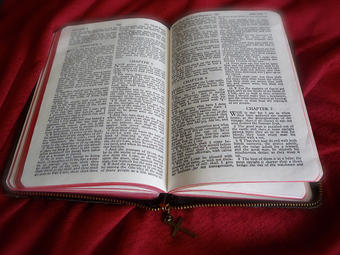
Section Branding
Header Content
Bible Study vs. Studying the Bible in Public Schools
Primary Content

The Columbus City Council is making headlines for considering a request to resurrect Bible study in public schools. That request is raising the ire of separation of church and state groups because it apparently diverges from what is currently allowed - the study of the Bible in public schools.
Bible study vs. studying the bible - yes, there is a difference. While 1963’s Abington Township District v. Schempp Supreme Court decision ruled that school prayer and devotion was unconstitutional in public schools, it did deem secular study of the Bible acceptable.
Why Studying the Bible Matters
Studying the Bible is vital - as religion writer David Van Biema stated in a 2007 "Time" magazine article,“SIMPLY PUT, THE BIBLE IS THE MOST influential book ever written.”
Consider the Biblical phrases that are a standard part of the English language. In his book “Begat: The King James Bible & the English Language,” David Crystal counted 257 biblical phrases that make their way into common use conversations.
Phrases like "what comes out of the mouths of babes," “an eye for an eye, a tooth for a tooth,” or “my brother’s keeper” all come from the Bible. And understanding its full meaning is difficult for students without knowing the full origin and context of those words.
Other works of literature reference the Bible too.
Throughout history, political leaders have used biblical phrases in their speeches. Countries have cited the Bible to justify conflicts, policy, and everything else.
Studying the Bible brings context and color to the studies of other subjects.
Bible Study in Public Schools a Prickly Topic
Bible study in public schools is a thornier issue because it involves religious interpretation and matters of faith - something that should be left to churches. If Bible studies are introduced in public schools, which denomination would lead it? Would the study be voluntary or mandatory? For that matter, would it trump personal religious study and worship on Sundays?
There are too many issues and problems surrounding that proposition. Quite frankly, once a religious point of view is brought into the discourse, it can lead to violating the laws separating church and state.
And it defeats the purpose of neutrally introducing students to valuable and sacred texts that - unfortunately, given this texting and video obsessed world - are increasingly becoming unknown.






